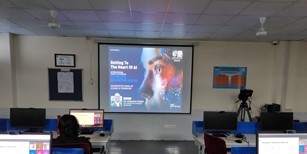Published on: May 30, 2025
An international guest lecture on “Affective Computing and AI” was held on 30th May 2025, drawing participation from 40 attendees, including students and faculty keen to explore the intersection of human emotion and artificial intelligence. The session offered an in-depth exploration of the psychological and physiological foundations of emotion and their integration into computational models. It provided attendees with a clear understanding of how emotions are perceived, structured, and classified—laying the groundwork for how AI systems can recognize and respond to emotional cues.
Through detailed discussions, the lecture examined various tools and techniques used in emotion recognition, including facial expression analysis, speech patterns, physiological signals, and text-based sentiment interpretation. Participants were introduced to the logic and design of computational pipelines that process these cues to detect and classify emotional states. Real-world examples, such as Pepper the social robot, emotion-aware music recommendation platforms, wearable emotion trackers, and emotionally intelligent AI chatbots, were discussed to highlight how affective computing is transforming industries from healthcare to entertainment and education.
The speaker emphasized how these technologies are shaping human-computer interaction by making AI systems more relatable, responsive, and trustworthy. The ability of emotionally expressive AI to influence user perception, trust, and decision-making was particularly insightful for participants interested in both technical development and user experience design. The session also encouraged critical reflection on the ethical implications and future scope of embedding emotional intelligence in machines.
Overall, the event was a rich academic experience, providing participants with foundational and applied knowledge in one of AI’s most human-centered frontiers. It fostered curiosity, critical thinking, and cross-disciplinary learning, making it a valuable addition to the academic calendar and a step forward in understanding the evolving emotional dimensions of artificial intelligence.




